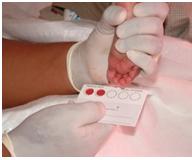“New born Screening is an easy test which Checks your baby for a series of Metabolic, Endocrine and Blood Disorders”
“A Simple Screen will reassure you & keep your baby safe.”
Go to newborn.my tab
Inborn Errors of Metabolism.
IEM‘s comprise a large class of genetic diseases involving disorders of metabolism /also called congenital metabolic diseases or inherited metabolic diseases. IEM include mitochondrial disease, organic acidemia, urea cycle defects, glycogen storage disease, lysosomal storage disease, MSUD and fatty acid oxidation defects.
- Can affect anyone.
- If both the parents carry the same defective gene responsible for one particular IEM, they run 25% risk of giving birth to a child with the particular IEM disease.
- Even after a baby is born, there are usually no signs or symptoms so parents can’t tell whether or not their baby may have a condition.
-
The symptoms of the baby may come up later in when life when they may present with neurologic defects, mental retardation (ranging from mild to severe), physical disability, neurological damage and even fatality. These can be prevented by an early screening program, immediate follow up and effective interventions such as dietary modifications for the neonate.
- IEM testing is being adopted as a “Standard of Care” by many countries.
-
The Extended Neonatal Screen for Inborn Errors of Metabolism (IEM) by Amino Acids and Acylcarnitines Tandem Mass Spectrometry is intended for the measurement and evaluation of amino acid, free carnitine and acylcarnitine concentrations from newborn heel prick blood samples dried on filter paper. The test has the capability of measuring over 40 analytes.
-
Other than the extended screen, the Neonatal Screen Check 1 and Check 2 screen the newborns for other hematologic and endocrine disorders using fluorometric assay. These assays test for disorders like Galactosemia, Congenital adrenal hyperplasia, Biotinidase deficiency, G6PD, and thyroid screens for T4 & TSH. The tests are all “Quantitative” and therefore more effective in a screening even for parameters like G6PD. Reference ranges are validated for newborn screening.
-
Special Genetic Neonatal hemoglobinopathies Screen
The neonatal sickle cell hemoglobinopathies screening program aims to achieve the lowest possible childhood mortality and morbidity rates for thalassemia, sickle cell disorders and other non sickling hemoglobinopathies hemoglobin variants through screening in the newborn period.Early identification of potential hemoglobinopathies allows for effective and appropriate follow up of the babies, thereby preventing complications and morbidity.
The Synapse Special Hemoglobinopathy Screen is a comprehensive Genetic Newborn Screen for Hemoglobinopathies which not only detects Sickle cell disease but also Non sickling hemoglobinopathies such as Alpha Thalassemia syndromes (Example: Hb H Disease), Beta Thalassemia syndromes (Example: Hb E/ β 0 thalassemia’s) and Other mutations such as Hb EE Disease. The screens involves a special algorithm including multiple techniques such as Thin Layer Isoelectric focusing, Citrate Agar Electrophoresis and Cellulose Acetate Electrophoresis. It is designed to screens for the presence of hemoglobins F, A, S, D, C and E in eluates of neonatal blood collected on filter paper.




